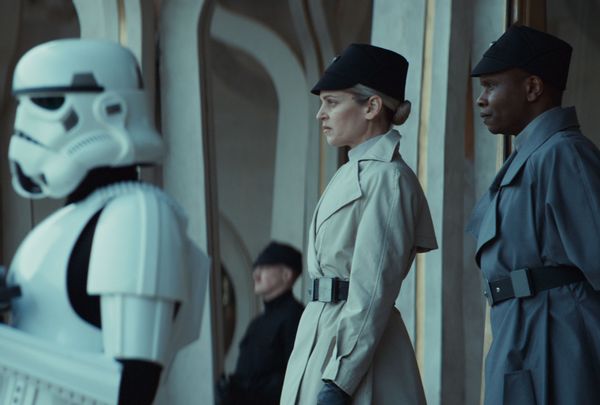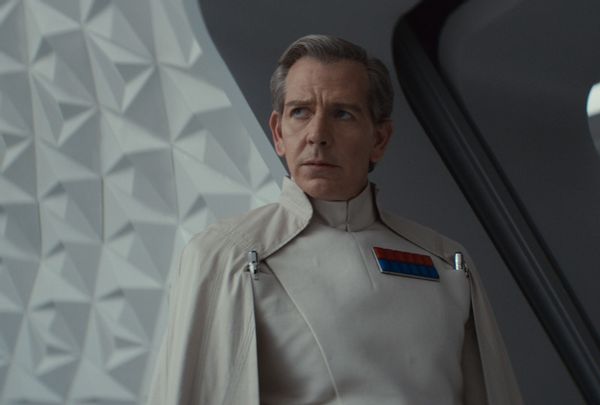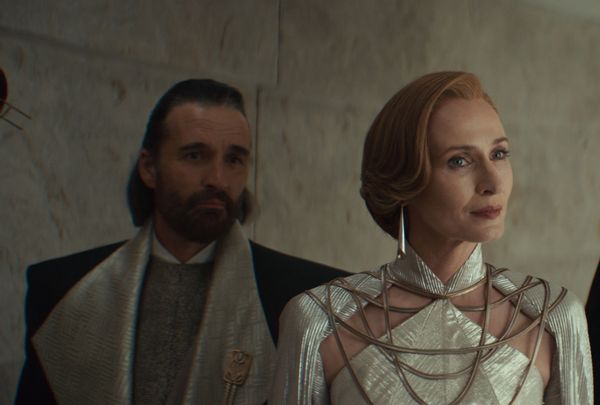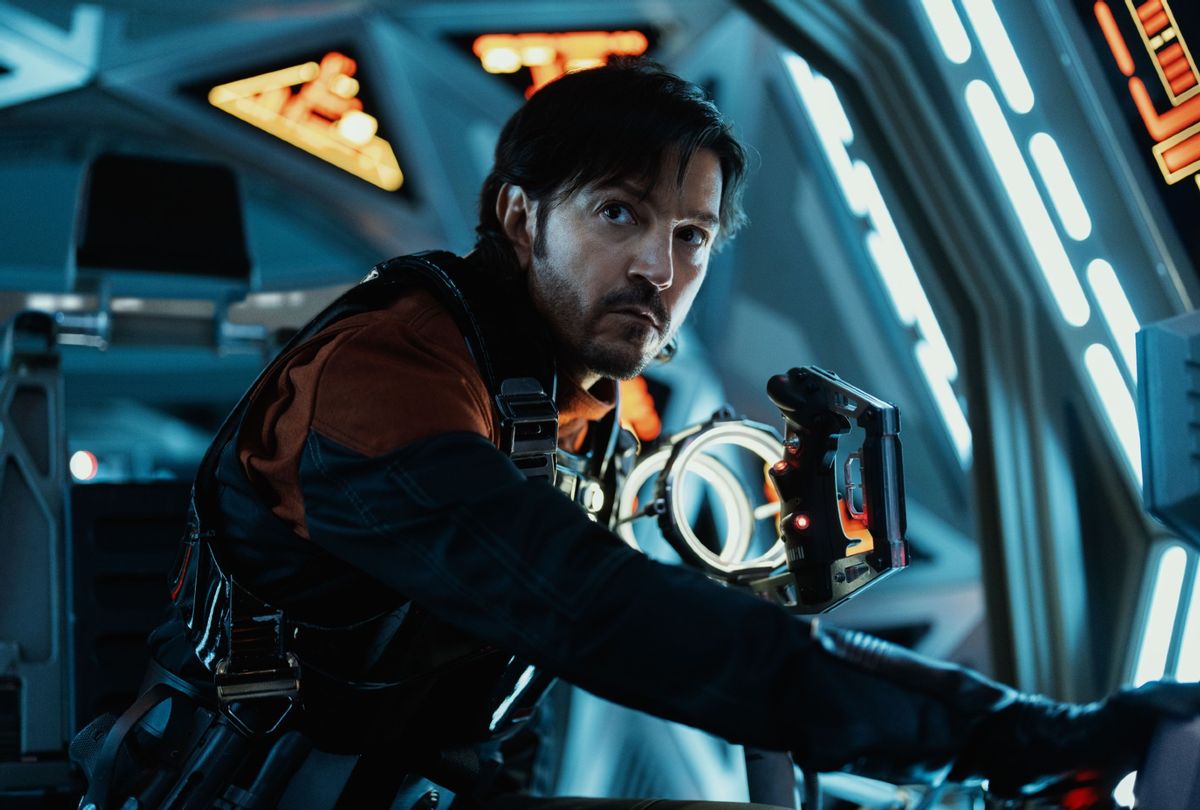The second season of “Andor” is a ticking clock counting down to the Galactic Civil War that launched “Star Wars.” At 12 episodes, it leaves a person yearning for more time with Diego Luna’s Cassian Andor while appreciating that the best TV series are insistently finite.
Besides, since the story leads directly into the events of “Rogue One: A Star Wars Story,” it’s really a 13-episode season with a spectacularly tragic finish. Cassian, Jyn Erso (played in the movie by Felicity Jones) and their off-the-books rebel band succeed in the mission and lose everything in the same planet-vaporizing flash.
Mounting a rebellion means resigning oneself to accepting loss after loss after loss until you finally pull out a victory.
This spirit of loss prevails throughout each of these tautly rendered final episodes in which Cassian becomes the unsung hub around which the revolution spins. Luna’s hero endures many along the way, as do Galactic Senator Mon Mothma (Genevieve O'Reilly) and Luthen Rael (Stellan Skarsgård), Cassian’s handler now that he’s a spy for the rebellion. The emotional scale of these losses varies, at first.
But as the season cruises into its final hours, everyone’s stakes narrow to the same conclusion of either taking moral comfort in serving the rebellion or dying under Imperial fascism. As one of the good guys grimly puts it, mounting a rebellion means resigning oneself to accepting loss after loss after loss until you finally pull out a victory.
That “Andor” mirrors our current political state is old news, although if the accuracy with which it chronicles fascism’s rise in a galaxy far, far away felt closer in 2022, it now mirrors our present.
 "Andor" (Lucasfilm/Disney+)Details of the title character’s biography reflect prominent symptoms foretelling our full-blown case of autocracy. His early years are spent in places ravaged by the Empire’s environmental degradation, first on Cassian’s destroyed planet of origin, then on his adoptive home world of Ferrix, a rocky salvaging base.
"Andor" (Lucasfilm/Disney+)Details of the title character’s biography reflect prominent symptoms foretelling our full-blown case of autocracy. His early years are spent in places ravaged by the Empire’s environmental degradation, first on Cassian’s destroyed planet of origin, then on his adoptive home world of Ferrix, a rocky salvaging base.
Later, he’s disappeared to an Imperial prison work colony where he and other inmates are forced into industrial slavery while his friend Bix Caleen (Adria Arjona) is captured and tortured.
Season 2 picks up four years before the Battle of Yavin, or BBY 4, and we can already see that Cassian’s competence as a spy is his curse. He grows to resent how much is being asked of him and can’t shake the toll that risking innocent lives takes on his conscience.
Where Season 1 shows how freedom fighters are made, not born, these new episodes depict how revolutions catch fire. They also depict the familiar reasons societies slide into totalitarianism, including the crucial role of weaponized disinformation.
Cassian is connected to everything, mainly as a witness to developments that are beyond his control when he isn't getting his allies out of tight spots.
Amid all that, he's also obligated to remain out of the Empire's crosshairs. What he doesn't know is that the woman hunting him, Imperial Security Bureau (ISB) supervisor Dedra Meero (Denise Gough) has a more pressing assignment now: the subjugation and destruction of the verdant, prosperous planet Ghorman.
With Ghorman, the writers have the full layer cake of heartbreaking possibilities. The place is enviably beautiful, and its wealth comes from naturally sourced fabric production, making it a fashion and design destination. It looks like a cross between Switzerland and Paris, the kind of place no one would expect the Empire would dare seize. Like every other place the Empire ruins, its citizens don’t understand why they can’t live in peace.
But Palpatine needs something from Ghorman, and it isn’t a few bolts of its famous cloth. Cloaking his reasons in the euphemisms of “energy independence” and an “energy initiative,” the emperor's toady Orson Krennic (Ben Mendelsohn, reprising his “Rogue One” role) informs those he’s recruited that Palpatine wants its mineral resources. The Empire’s objective, he claims, is to “transform the galactic economy and solidify imperial authority” by creating a source of stable, unlimited power.
We know that power is only meant for the Death Star.
 "Andor" (Lucasfilm/Disney+)Unspoken but shown is the fact that Ghorman’s population is overwhelmingly white and cosmopolitan, not at all like the dusky working-class folk on shabby Ferrix. Therefore, to sell their culture’s destruction to the ignorant masses, the Empire mounts a disinformation campaign designed to transform Ghorman and its people into terrorists.
"Andor" (Lucasfilm/Disney+)Unspoken but shown is the fact that Ghorman’s population is overwhelmingly white and cosmopolitan, not at all like the dusky working-class folk on shabby Ferrix. Therefore, to sell their culture’s destruction to the ignorant masses, the Empire mounts a disinformation campaign designed to transform Ghorman and its people into terrorists.
Season 2 feels like much more of an ensemble affair as showrunner Tony Gilroy expands the show’s focus beyond one character’s moral development to more thoroughly embroider others that are just as worthwhile. Luna remains an expert in conveying grit and melancholy without saying a word, and that stoicism carries every moment he's onscreen.
Since Cassian's job is to change history without leaving fingerprints on the text, there’s a kind of grim romance to him. Much of that has to do with the way he holds hope in one hand and fatalism in the other, but Cassian borrows plenty of sorrow from the people surrounding him.
Oppression pays well to those in its employ and can be tolerable to those who aren’t, as long as it’s not making their lives hell.
Bix and her Ferrix compatriots are now refugees — yes, more topical relevance — and the Empire has a passion for hunting undocumented workers. Skarsgård makes Luthen more rumpled and prone to rage about the grave he’s dug for himself even as he preaches that fighting fascism requires radical sacrifice. As Imperial forces cross more lines, he realizes how little time he and his assistant Kleya (Elizabeth Dulau) have before their spy network is discovered.
Mon Mothma’s journey is synonymous with Luthen’s, although her tenuous position in a Senate dominated by Palpatine lickspittles would make her downfall much louder.
Although this second season has its share of "Rogue One" cameos, including the return of Forest Whitaker’s Saw Gerrera, it mostly brushes off the franchise’s tendency to sentimentalize. This includes the further expansion of Mon Mothma, who has been part of the “Star Wars” story from the beginning, mainly seen and barely heard from.
O’Reilly nails how much of a headache it is to hide the stress of funding an insurgency behind endless smiles. She and Luthen also share a ruthless devotion to pragmatism, although he applies that to the worthiness of strangers’ lives, whereas the good senator can’t help but sell out her loved ones.
We need your help to stay independent
Right now, the not-so-distant similarities between Imperial fascism and authoritarianism, American-style — disquieting as they are — might not be as bone-chilling as the domestic scenes between Dedra and Syril Karn (Kyle Soller), who have somehow formed a relationship of professional and personal convenience.
Mendelsohn and Lesser have the luxury of playing to type here, with the former channeling his version of Imperial unctuousness and the latter lending a professorial chill to his acceptance of unconscionable orders.
Gough and Soller’s dynamic, however, strikes a different note. It's as if their duo doesn’t entirely know how to perform affection, and this makes them oddly believable as a couple. Their shared scenes also emphasize the few degrees of humanity remaining in Syril that Dedra never had, leading us to wonder what each of them wants from the other.
That question is part of what makes them apt faces for this totalitarian support structure — a white-collar power couple eager to secure promotions at a company that’s really going places. They and others like them – primarily Syril’s overbearing mother Eedy (Kathryn Hunter) – illustrate why people living in supposedly decent societies go along with fascism until it’s unsustainable. Oppression pays well to those in its employ and can be tolerable to those who aren’t, as long as it’s not making their lives hell.
 "Andor" (Lucasfilm/Disney+)Gilroy sets a nimble course in these episodes, covering four years to the first season’s one. Given all the signposts the story’s obligated to hit, the plot’s cohesiveness is a minor miracle.
"Andor" (Lucasfilm/Disney+)Gilroy sets a nimble course in these episodes, covering four years to the first season’s one. Given all the signposts the story’s obligated to hit, the plot’s cohesiveness is a minor miracle.
You may not agree with that at times, such as the choice to resume Mon Mothma's subplot by miring her and her cousin Vel (Faye Marsay) in the humdrum task of overseeing her daughter's wedding. Court intrigue within this floral-laden setting sets up a later payoff when the senator becomes who she’s meant to be. It’s a pale substitute for the delicious tension inherent to deadly cloak-and-dagger exploits. But the writers are correct to skip past skirmishes that don’t mean much to grant a close-up to the small moments that do.
The Ghorman plot builds to that action, of course, although the inevitable culmination of the Empire forcing its hand is horrifying, especially in light of what's going on in our world now.
Want a daily wrap-up of all the news and commentary Salon has to offer? Subscribe to our morning newsletter, Crash Course.
I’m guessing Gilroy (or his brother Dan, who wrote other relevant episodes in this arc) didn't intend to draw direct parallels between this fiction and the destruction of Gaza — at least that's what their Disney bosses would claim. Colonizing forces have always viewed the people standing between them and the land they want like the Empire sees cultures standing in its way.
But even daring to fictionalize some version of that atrocity raises “Andor” above other spinoffs. It reminds us that "Star Wars" is the story of an insurgency, like many versions that have arisen throughout Earth's history. On the other side of those epics is the machinery rewriting those accounts to make the aggressors into heroes and the rebels into criminals. Like the Third Reich had its propaganda machine, “Star Wars” has Imperial News, which operates a lot like Fox’s infotainment beast by shamelessly broadcasting its lies across the star system.
Maybe this would all be too depressing to bear if we didn’t know that the good guys eventually triumph. Gripping as these closing chapters of “Andor” are, they’re also overwhelmingly heavy until an old friend from “Rogue One,” K-2SO (Alan Tudyk) enters the fight and brings his snark and sarcasm along for the ride.
His arrival also marks the beginning of this show’s definitive ending, and we’re right to mourn that we won’t see more “Andor.” Along with that, however, we can appreciate Gilroy’s concise vision and willingness to do the most in fewer hours, ensuring “Andor” concludes atop the very short list of the sharpest, smartest “Star Wars” stories ever told.
Season 2 of "Andor" premieres with three episodes on Tuesday, April 22, with three new episodes debuting weekly on Disney+.
Read more
about this series



Shares